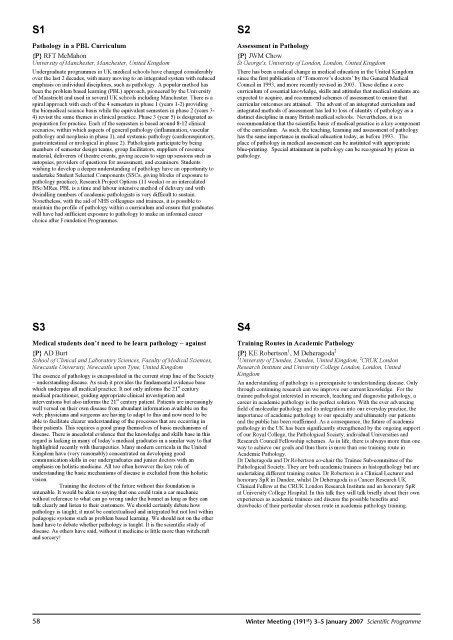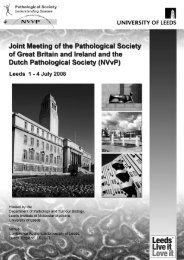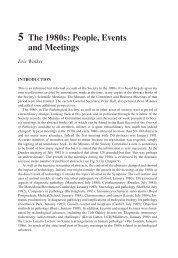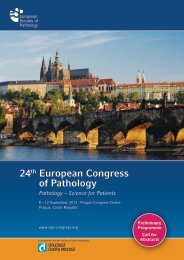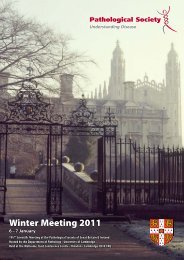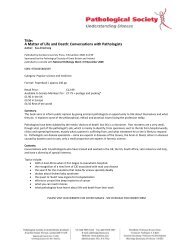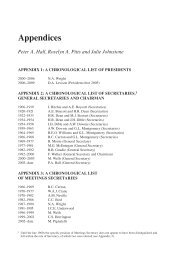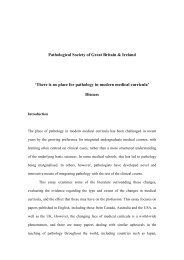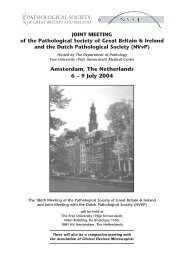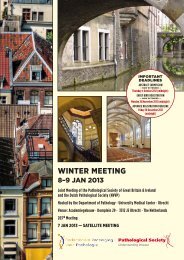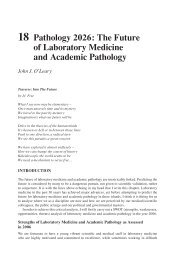2007 Winter Meeting - London - The Pathological Society of Great ...
2007 Winter Meeting - London - The Pathological Society of Great ...
2007 Winter Meeting - London - The Pathological Society of Great ...
- No tags were found...
You also want an ePaper? Increase the reach of your titles
YUMPU automatically turns print PDFs into web optimized ePapers that Google loves.
S1Pathology in a PBL Curriculum{P} RFT McMahonUniversity <strong>of</strong> Manchester, Manchester, United KingdomUndergraduate programmes in UK medical schools have changed considerablyover the last 2 decades, with many moving to an integrated system with reducedemphasis on individual disciplines, such as pathology. A popular method hasbeen the problem based learning (PBL) approach, pioneered by the University<strong>of</strong> Maastricht and used in several UK schools including Manchester. <strong>The</strong>re is aspiral approach with each <strong>of</strong> the 4 semesters in phase 1 (years 1-2) providingthe biomedical science basis while the equivalent semesters in phase 2 (years 3-4) revisit the same themes in clinical practice. Phase 3 (year 5) is designated aspreparation for practice. Each <strong>of</strong> the semesters is based around 8-12 clinicalscenarios, within which aspects <strong>of</strong> general pathology (inflammation, vascularpathology and neoplasia in phase 1), and systemic pathology (cardiorespiratory,gastrointestinal or urological in phase 2). Pathologists participate by beingmembers <strong>of</strong> semester design teams, group facilitators, suppliers <strong>of</strong> resourcematerial, deliverers <strong>of</strong> theatre events, giving access to sign up sessions such asautopsies, providers <strong>of</strong> questions for assessment, and examiners. Studentswishing to develop a deeper understanding <strong>of</strong> pathology have an opportunity toundertake Student Selected Components (SSCs, giving blocks <strong>of</strong> exposure topathology practice), Research Project Options (11 weeks) or an intercalatedBSc/MRes. PBL is a time and labour intensive method <strong>of</strong> delivery and withdwindling numbers <strong>of</strong> academic pathologists is very difficult to sustain.Nonetheless, with the aid <strong>of</strong> NHS colleagues and trainees, it is possible tomaintain the pr<strong>of</strong>ile <strong>of</strong> pathology within a curriculum and ensure that graduateswill have had sufficient exposure to pathology to make an informed careerchoice after Foundation Programmes.S2Assessment in Pathology{P} JWM ChowSt George's, University <strong>of</strong> <strong>London</strong>, <strong>London</strong>, United Kingdom<strong>The</strong>re has been a radical change in medical education in the United Kingdomsince the first publication <strong>of</strong> ‘Tomorrow’s doctors’ by the General MedicalCouncil in 1993, and more recently revised in 2003. <strong>The</strong>se define a corecurriculum <strong>of</strong> essential knowledge, skills and attitudes that medical students areexpected to acquire, and recommend schemes <strong>of</strong> assessment to ensure thatcurricular outcomes are attained. <strong>The</strong> advent <strong>of</strong> an integrated curriculum andintegrated methods <strong>of</strong> assessment has led to loss <strong>of</strong> identity <strong>of</strong> pathology as adistinct discipline in many British medical schools. Nevertheless, it is arecommendation that the scientific basis <strong>of</strong> medical practice is a key component<strong>of</strong> the curriculum. As such, the teaching, learning and assessment <strong>of</strong> pathologyhas the same importance in medical education today, as before 1993. <strong>The</strong>place <strong>of</strong> pathology in medical assessment can be instituted with appropriateblue-printing. Special attainment in pathology can be recognised by prizes inpathology.S3Medical students don’t need to be learn pathology – against{P} AD BurtSchool <strong>of</strong> Clinical and Laboratory Sciences, Faculty <strong>of</strong> Medical Sciences,Newcastle University, Newcastle upon Tyne, United Kingdom<strong>The</strong> essence <strong>of</strong> pathology is encapsulated in the current strap line <strong>of</strong> the <strong>Society</strong>– understanding disease. As such it provides the fundamental evidence basewhich underpins all medical practice. It not only informs the 21 st centurymedical practitioner, guiding appropriate clinical investigation andinterventions but also informs the 21 st century patient. Patients are increasinglywell versed on their own disease from abundant information available on theweb; physicians and surgeons are having to adapt to this and now need to beable to facilitate clearer understanding <strong>of</strong> the processes that are occurring intheir patients. This requires a good grasp themselves <strong>of</strong> basic mechanisms <strong>of</strong>disease. <strong>The</strong>re is anecdotal evidence that the knowledge and skills base in thisregard is lacking in many <strong>of</strong> today’s medical graduates in a similar way to thathighlighted recently with therapeutics. Many modern curricula in the UnitedKingdom have (very reasonably) concentrated on developing goodcommunication skills in our undergraduates and junior doctors with anemphasis on holistic medicine. All too <strong>of</strong>ten however the key role <strong>of</strong>understanding the basic mechanisms <strong>of</strong> disease is excluded from this holisticvision.Training the doctors <strong>of</strong> the future without this foundation isuntenable. It would be akin to saying that one could train a car mechanicwithout reference to what can go wrong under the bonnet as long as they cantalk clearly and listen to their customers. We should certainly debate howpathology is taught; it must be contextualised and integrated but not lost withinpedagogic systems such as problem based learning. We should not on the otherhand have to debate whether pathology is taught. It is the scientific study <strong>of</strong>disease. As others have said, without it medicine is little more than witchcraftand sorcery!S4Training Routes in Academic Pathology{P} KE Robertson 1 , M Deheragoda 21 University <strong>of</strong> Dundee, Dundee, United Kingdom, 2 CRUK <strong>London</strong>Research Institute and University College <strong>London</strong>, <strong>London</strong>, UnitedKingdomAn understanding <strong>of</strong> pathology is a prerequisite to understanding disease. Onlythrough continuing research can we improve our current knowledge. For thetrainee pathologist interested in research, teaching and diagnostic pathology, acareer in academic pathology is the perfect solution. With the ever advancingfield <strong>of</strong> molecular pathology and its integration into our everyday practice, theimportance <strong>of</strong> academic pathology to our specialty and ultimately our patientsand the public has been reaffirmed. As a consequence, the future <strong>of</strong> academicpathology in the UK has been significantly strengthened by the ongoing support<strong>of</strong> our Royal College, the <strong>Pathological</strong> <strong>Society</strong>, individual Universities andResearch Council Fellowship schemes. As in life, there is always more than oneway to achieve our goals and thus there is more than one training route inAcademic Pathology.Dr Deheragoda and Dr Robertson co-chair the Trainee Sub-committee <strong>of</strong> the<strong>Pathological</strong> <strong>Society</strong>. <strong>The</strong>y are both academic trainees in histopathology but areundertaking different training routes. Dr Robertson is a Clinical Lecturer andhonorary SpR in Dundee, whilst Dr Deheragoda is a Cancer Research UKClinical Fellow at the CRUK <strong>London</strong> Research Institute and an honorary SpRat University College Hospital. In this talk they will talk briefly about their ownexperiences as academic trainees and discuss the possible benefits anddrawbacks <strong>of</strong> their particular chosen route in academic pathology training.58 <strong>Winter</strong> <strong>Meeting</strong> (191 st ) 3–5 January <strong>2007</strong> Scientific Programme


